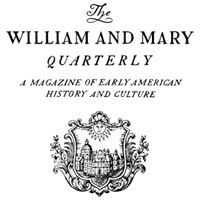At a recent talk, Chris Grasso and Karin Wulf discussed how to publish scholarly articles and book reviews. Wulf serves as the Book Review Editor for The William and Mary Quarterly. From this position, she offered an enlightening perspective on how to publish scholarly book reviews.  Wulf encouraged the audience to look at book reviews as opportunities rather than as obligations. Book reviews give scholars the chance to get noticed. Through a review, readers become acquainted with both the reviewed book and the book reviewer. Book reviews serve as the last step in the peer review process; they offer the last formal piece of scholarly conversation about the contribution of a particular scholar. Wulf mentioned that book reviews are read more often than journal articles because they allow scholars to access the most recent scholarship in a matter of minutes. Moreover, book reviews have longevity. Scholars read reviews long after publishers release a book. For Example, Wulf mentioned that Richard Dunn's October 1999 review of Ira Berlin's Many Thousands Gone is the most frequently accessed piece for the WMQ. For published pieces after 1999, the distinction goes to Peter Coclanis's review of Ira Berlin's The Captivity of a Generation. Wulf recommended the latter piece as an example of a great book review.
Wulf encouraged the audience to look at book reviews as opportunities rather than as obligations. Book reviews give scholars the chance to get noticed. Through a review, readers become acquainted with both the reviewed book and the book reviewer. Book reviews serve as the last step in the peer review process; they offer the last formal piece of scholarly conversation about the contribution of a particular scholar. Wulf mentioned that book reviews are read more often than journal articles because they allow scholars to access the most recent scholarship in a matter of minutes. Moreover, book reviews have longevity. Scholars read reviews long after publishers release a book. For Example, Wulf mentioned that Richard Dunn's October 1999 review of Ira Berlin's Many Thousands Gone is the most frequently accessed piece for the WMQ. For published pieces after 1999, the distinction goes to Peter Coclanis's review of Ira Berlin's The Captivity of a Generation. Wulf recommended the latter piece as an example of a great book review.
Wulf spent some time addressing the ethics of reviewing. First, scholars should review books only when they think they can be fair. Everyone understands that reviewing is not an impartial business, but scholars should avoid reviewing books that are too closely related to their work; these reviews often become essays about why the reviewed book is not as good as the reviewer's book. Scholars should also avoid reviewing the work of close colleagues and friends. Wulf suggested that reviewers consult the American Historical Association website for the ethical standards of the profession; H-Net Reviews offers a summarized version here. Someone in the audience offered the National Book Critics Circle as another resource with useful guidelines for reviewing.
Wulf also discussed how book reviews in The William and Mary Quarterly differ from other journals. The WMQ publishes lengthy reviews of at least 1200 words for a single book, many of the reviews run 1500-1700 words. The WMQ only considers reviews written by scholars with a doctorate.
Wulf encouraged junior scholars to be proactive and seek out book review editors at journals and on-line forums like H-Net Reviews. In their e-mails, scholars should provide the editor with a brief introductory note about who they are and the kinds of books they would like to review. Scholars should also attach a CV to their e-mail. For those content to wait until book reviewers discover them, Wulf mentioned that she knows several book review editors who keep an eye out for savvy reviewers on H-Net Reviews and by reading book reviews in other journals.